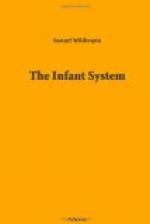manage every child, would be like a person
undertaking to describe a voyage to the moon.
Every person’s own good sense must decide for
them according to character and circumstances; and
as to rewards, the same discrimination must be used.
One child will set much value on a little book, whilst
another will destroy it in a day; and though the book
might be worth the sixpence, a half-penny worth of
what they call good stuff would be much more
valuable. I have had more business done sometimes
for a plum than for a sixpenny book. It is never
necessary to give the child badges of distinction,
and to allow it as many orders and degrees as an Austrian
field-marshal. Crosses at the button holes, and
bits of ribbon on the shoulders are unnecessary; they
throw an apple of discord between the young creatures,
who have sense enough to see that these things are
frequently given away with a wonderous lack of discrimination,
and sometimes to please parents more than reward merit.
A carraway comfit put into the mouth of an infant will
do more good than all the badges of distinction that
I have mentioned, as a reward; but with respect to
punishment, more will be said on it in my larger work,
when we come to treat of National Education. Each
creation of the most High is truly wonderful, and worthy
of our constant study. We may learn lessons of
the truest wisdom from the meanest leaf or insect,
if we would regard it as one of His works. But
how much more may be learnt, and what an amount of
useful instruction may be gained, by a study of the
finite mind, the highest work in creation. Many
have turned their attention to minerals, plants, and
animals, and thus added to our stores of knowledge.
If equal attention had been paid to the young mind,
to mark the gradual germination of its intellectual
and moral powers, how much more accurate would our
knowledge be of the proper methods of dealing with
it both in instruction, direction, and punishment.
Thus to study it has been the aim of my life, and
I have made observations on thousands of children.
When this great and living book is more constantly
read, the contents of this humble volume may have
a better chance of being appreciated; and the utter
absurdity of many things palmed upon the public for
the education of infants made glaringly manifest.
CHAPTER XI.
LANGUAGE.
Means for conveying instruction—Method of teaching the alphabet in connection with objects—Spelling—Reading—Developing lessons—Reading lessons in Natural History—The Arithmeticon—Brass letters—Their uses.
* * * * *
“Without things, words, accumulated by misery in the memory, had far better die than drag out a miserable existence in the dark. Without words, theirs stay and support, things unaccountably disappear out of the storehouse, and may be lost for ever; but bind a thing with a word, a strong link, stronger than any steel, and softer than any silk, and the captive remains for ever happy in its bright prison-house.”—Wilson.




